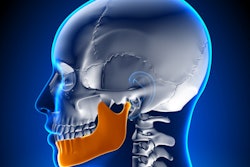A multidisciplinary system approach is needed to advance clinicians' understanding of temporomandibular joint and muscle disorders (TMJDs), and a major paradigm shift needs to occur in the way TMJDs are viewed in the scientific and clinical communities, according to a new study in the Clinical Journal of Pain (March/April 2011, Vol. 27:3, pp. 268-274).
"TMJDs are ill-defined, painful, debilitating disorders," noted researchers from the Medical College of Wisconsin.
For their study, they recruited 1,511 TMJD-affected individuals through a Web-based registry of patients maintained by the TMJ Association, a patient advocacy organization, along with 57 non-TMJD individuals. Results were compared with findings from the National Health and Nutrition Examination Survey.
The researchers found that TMJD-affected individuals were, on average, 41 years of age and predominantly female (90%). Nearly 60% of both men and women reported recent pain of moderate-to-severe intensity, with a quarter of them indicating interference or termination of work-related activities.
In the case-control comparison, a higher frequency of headaches, allergies, depression, fatigue, degenerative arthritis, fibromyalgia, autoimmune disorders, sleep apnea, and gastrointestinal complaints were prevalent among those affected with TMJD. Many of the associated comorbid conditions were more than six times more likely to occur after TMJD was diagnosed.
Among the 46 types of treatments listed in the study, the most effective relief for most affected individuals (91%) were thermal therapies -- hot/cold packs to the jaw area or hot baths. Nearly 40% of individuals affected with TMJD patients reported one or more surgical procedures, and nearly all were treated with one or many different medications.
"The data provide evidence that TMJD represent a spectrum of disorders with varying pathophysiologies, clinical manifestations, and associated comorbid conditions," the researchers concluded. "The findings underscore the complex nature of TMJD, the need for more extensive interdisciplinary basic and clinical research, and the development of outcome-based strategies to more effectively diagnose, prevent, and treat these chronic, debilitating conditions."



















